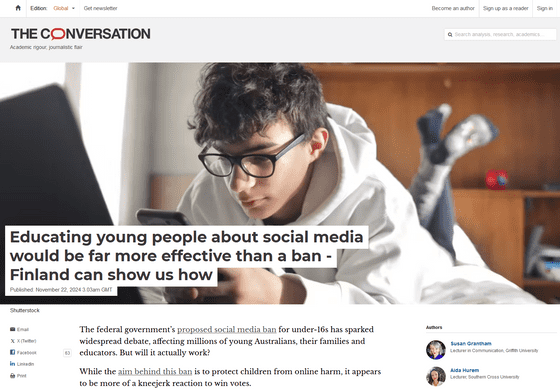Experts say 'educating young people on social media' is far more beneficial than censorship, criticizing social media regulation as a knee-jerk reaction

In November 2024, Australia introduced
Educating young people about social media would be far more effective than a ban - Finland can show us how
https://theconversation.com/educating-young-people-about-social-media-would-be-far-more-effective-than-a-ban-finland-can-show-us-how-244304

Susan Grantham, a lecturer at Griffith University in Australia, and Aida Hürrem, a lecturer at Southern Cross University, said of the new law banning social media use by people under the age of 16, 'The intention behind this ban is to protect children from online harm, but it seems more like a knee-jerk reaction to gain votes. In a world where technological advances are accelerating and online communication is part of everyday life, teaching children how to use the internet safely is a more effective way to protect them from harm while making them technologically literate.'
Criticism has also come from within Parliament, with Independent MP Zoe Daniel pointing out that it is difficult to completely shut young people out of social media, and saying she is concerned that banning children's access to social media will make it an even more unruly and dangerous place.
Senator Fatima Peyman also complained that young people are increasingly feeling that their voices are not being heard in parliament.

Experts are opposed to regulating social media because they believe it could disrupt the social well-being of young people who conduct much of their social lives online, leading to them being cut off from each other.
This has been borne out in a survey of international students, who are particularly likely to live away from their families and friends, and Grantham and his colleagues emphasized that the risk of suffering from isolation and loneliness is the same for both international students and non-international students.
Furthermore, starting to use social media as soon as children turn 16 could exacerbate the very problems that advocates of social media restriction are concerned about, such as risky attention-seeking behavior on social media and exposure to harmful content.
For example, in Australia, there was an incident where a female influencer who tried to recruit 18-year-olds as male actors on OnlyFans, a social networking site dealing in sexual content, had her visa revoked, shocking Australian society. The fact that the recruitment took place during 'Schoolies,' a long holiday after graduating from high school, also sparked controversy.
After the incident, OnlyFans creators posted TikTok videos of young men lining up to meet them.
@kay.manuel.schoolies Schoolies day 1 is now complete! #schoolies #goldcoast #kaymanuel ♬ original sound - Kay Manuel Schoolies
This is seen as a case in which young people who were not immune to extreme content faced exploitation due to insufficient education and support systems.
In contrast to the SNS regulation theory, in Finland, digital literacy is integrated into the education curriculum, and students of all grades learn how to use digital tools and technology.
In addition, under the concept that 'digital capabilities are civic skills,' digital literacy education is being encouraged as lifelong learning that goes beyond the framework of school education, with libraries and community centers now holding skill improvement programs for adults.
This long-standing approach of prioritizing education over regulation has made Finland one of the world's most resistant to fake news, having ranked first in the Media Literacy Index for six consecutive years.
Finland is the strongest against fake news, where is Japan? - GIGAZINE

There is a precedent in Australia, where long-term education reforms about the health risks of tobacco, which began in the 1990s, have succeeded in significantly reducing the number of Australians aged 14 and over who have ever smoked.
For these reasons, the experts recommend that 'the proposed legislation before Congress oversimplifies a very complex issue. Protecting young people requires long-term solutions, including digital literacy, informed choices and strong protections, rather than quick, hyperbolic and short-sighted measures.'
Related Posts:
in Web Service, Posted by log1l_ks







